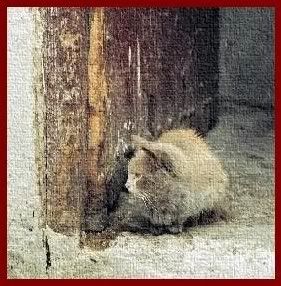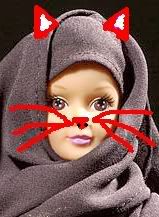A Streetcar Named Bica*: an Addendum of Sorts
 A week or so ago, I was handed a copy of Israeli writer A.B. Yehoshua's "The Liberated Bride" and last night, quite by chance, a certain passage lept from the page and slapped me hard in the face. Not literally of course because that would be stretching the boundaries of literary license as well as be awfully painful (and reading should be pleasurable) whereas a papercut would be both plausible to my readership and still be pretty nasty. Nonetheless, it was a nonliteral bitch slap.
A week or so ago, I was handed a copy of Israeli writer A.B. Yehoshua's "The Liberated Bride" and last night, quite by chance, a certain passage lept from the page and slapped me hard in the face. Not literally of course because that would be stretching the boundaries of literary license as well as be awfully painful (and reading should be pleasurable) whereas a papercut would be both plausible to my readership and still be pretty nasty. Nonetheless, it was a nonliteral bitch slap.The novel's protagonist is a Professor of Near Eastern Studies (which I once aspired to be) with a specialty in modern Algerian history (which I never aspired to have). In the course of his quest to find a link between the country's very modern propensity for violence and civil war, and their not as modern colonial & post-colonial heritage, he notes:
When an entire people is linguistically confused, what hope is there for dialogue and communication?
Four languages mingle in Algerian life, leading to a chaotic identity:
First there is the Berber, the indigenous language of the Maghreb, spoken by close to a third of the population.
Second there is North African Arabic, known to every Algerian.
These two languages are oral media not used for writing, even though Berber once had a written form.
The two written languages of Algeria are French and classical literary Arabic. Neither, however, is a modern tongue. Both are in effect foreign languages. Classical Arabic comes with Islamization and French with Western colonialism. The first arrived as a sacred tongue, the second as a secular one.
It is obvious that, historically considered, reading and writing are forms of submission and penetration that create an intricate dialectic between the individual and the written language. To write in French is to betray. To write in Arabic is to profane.
... The complexity of the situation is problematic for every Algerian. Fully living an Algerian identity means knowing four languages, being at home in four cultures, and adapting to four different psychological standpoints.
Practically speaking, only 10 percent of the population of Algeria is proficient in all four languages. Such a small group is unable to bring about an integration of four different worlds. And even if such an integration were possible, it would be inaccessible to the majority of Algerians.
... and so we have a situation in which different sectors of social activity, having no common language, remain totally distinct. Classical Arabic is the language of religion. French is used for economic, administrative, and scientific purposes. North African Arabic and Berber are spoken in the street and in the family. This is the great curse of the Algerian identity. It's not that such an identity doesn't exist, but that it is linguistically fragmented beyond any possibility of synthesis.
I could comment on this further and hamfistedly draw parallels to Morocco (perhaps even throwing in a PowerPoint demonstration or two) for the benefit of any inordinantly obtuse readers lurking about in Cat in RabatWorld, but I know there aren't any. You're all a terribly clever lot.
Interesting, no?
*This time the photo isn't Bica but it is a streetcar. It would seem that I'm having a difficult time coordinating blog titles and photographs. If you're curious (and I doubt you are), this is Lisbon's #28 tram which meanders through the Baixa to the Alfama.








3 Comments:
I'm commenting inordinately quickly because, like your Da Vinci Code debacle, I'm having the same problem with The Prestige, however, my husband isn't patient enough to wait for it in English.
I think that's a very fair, valid, and good point.
On a totally different hand which I feel the need to separate by a totally new paragraph - to me, it does not present enough excuse for this younger, educated and perhaps even elite generation who CAN read, not to do so. Perhaps it frustrates me most because of how much time they DO have on their hands, which seems to be spent with TV and the internet. I once asked my students how many hours a day they watched TV. I asked in nearly every class then informally averaged the answers.
Average? 4 hours a day, with a range from 1 to 10 hours.
Taar, I couldn't agree with you more. Everyone has a satellite dish. Thousands of Moroccans living in shantytowns owned a dish before I ever did. It's especially aggravating in the case of young people who live in urban centres where there are decent book titles translated into French. When I walk into a bookstore in Rabat, the overwhelming majority of people I see (and we're not talking throngs here) are older French nationals.
Will download Prestige from the Internet ... I give up on dvds. Just got Volver & the subtitles were only in French!
I don't doubt that similar situations exist in other places that were colonialized by The West. I'm thinking of India, where English is still the language of commerce, politics and "national" communication, Hindu is the main "official language", but there are at least 14 other "official" languages.
I'm quite certain that this sort of disconnect happens in other former colonies, but it certainly seems pronounced in North Africa, due to the two "non-written" languages which are widely spoken.
Interesting blog (as usual).
Post a Comment
<< Home